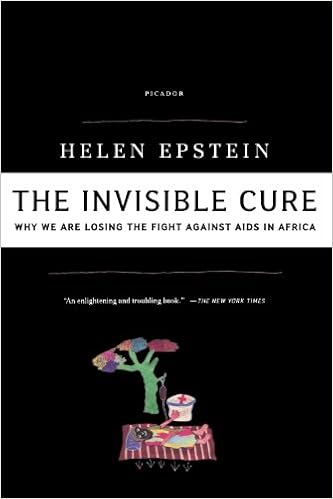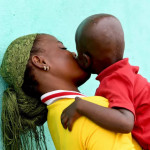The Global bookstore features books that address HIV/AIDS issues worldwide. Books are listed in alphabetical order by title. Click the title to read more about each book. Missing your favorite book? Click here to send us your recommendations.
- 28: Stories of AIDS in Africa
- Black Death: AIDS in Africa
- Habiba My Habiba
- I Am That Child: Changing Hearts and Changing the World
- The Invisible Cure: Why We Are Losing the Fight Against AIDS in Africa
- Letting Them Die: Why HIV/AIDS Prevention Programmes Fail
- RethinkHIV: Smarter Ways to Invest in Ending HIV in Sub-Saharan Africa
- Caribbean Pleasure Industry: Tourism, Sexuality, and AIDS in the Dominican Republic

28: Stories of AIDS in Africa
by Stephanie Nolen
For the past six years, Stephanie Nolen has traced AIDS across Africa, and 28 is the result: an unprecedented, uniquely human portrait of the continent in crisis. Through riveting, anecdotal stories, she brings to life men, women, and children involved in every AIDS arena, making them familiar. And she explores the effects of an epidemic that well exceeds the Black Plague in scope, and the reasons why we must care about what happens.
In every instance, Nolen has borne witness to the stories she relates, whether riding with truck driver Mohammed Ali on a journey across Kenya; following Tigist Haile Michael, a smart, shy fourteen-year-old Ethiopian orphan fending for herself and her baby brother on the slum streets of Addis Ababa; chronicling the efforts of Alice Kadzanja, an HIV-positive nurse in Malawi; or interviewing Nelson Mandela’s family about coming to terms with his own son’s death from AIDS. Nolen’s stories reveal how the disease works and spreads; how it is inextricably tied to conflict and famine and to the diverse cultures it has ravaged; how treatment works, and how people who can’t get treatment fight to stay alive with courage and dignity against huge odds.
Imagine the entire population of New York, Chicago, and Los Angeles combined infected with HIV, and its magnitude in Africa is clear. Writing with power and simplicity, Stephanie Nolen makes us listen, allows us to understand, and inspires us to care. Timely and transformative, 28: Stories of AIDS in Africa is essential reading for anyone concerned about the fate of humankind.

Black Death: AIDS in Africa
by Susan Hunter
Writing for the general public, medical anthropologist Hunter seeks to unravel the scientific, social, political, economic, and historic aspects of the AIDS crisis in Africa, demanding that long-term control of the disease will require both individual and social change. After first providing a picture of the global AIDS crisis, she presents a picture of Africa’s political and economic development, then turning her attention to the dynamics of epidemics in general. She also applies evolutionary theory to the understanding of AIDS, controversially suggesting, among other observations, that genetics plays a role in the attitudes of non-Africans towards the African crisis.

Habiba My Habiba
by Bob Danirela
Habiba My Habiba is set against the horror of the AIDS epidemic in Africa. This is a personalized account of a young man who set out to earn money in a distant city in order to get married. But in due course, he is distracted from his efforts to earn money and takes up with several loose women.He falls in love with one of them, who has a heart-rending story of her own to tell. These star-crossed lovers, finally having found each other, come face-to-face with a bleak future exasperated by their lack of money or resources. Even as they struggle with the practical problems of trying to earn a decent living, and traveling to another country for work, they are faced with the ultimate problem, AIDS, which they called simply “the syndrome.” It is a tragic Romeo and Juliet story with a modern twist that focuses on this modern scourge.

I Am That Child: Changing Hearts and Changing the World
by Elizabeth Geitz
What happens when three American women put their faith into action in a developing nation? In I Am That Child, Episcopal priest Elizabeth Geitz proves that cross-cultural relationships among people of faith can change our world one person at a time. Geitz welcomes readers to join her pilgrimage to an orphanage in Cameroon, sharing both humorous and gut-wrenching wisdom from leaders and children who struggle against AIDS, global poverty and sexism. Along the way, Geitz and readers take a hard look at race and cultural privilege and find hope for reconciliation back home. The book concludes with study and resource guides to help readers engage global poverty efforts and build community across continents or across the street.

The Invisible Cure: Why We Are Losing the Fight Against AIDS in Africa
by Helen Epstein
The Invisible Cure is an account of Africa’s AIDS epidemic from the inside--a revelatory dispatch from the intersection of village life, government intervention, and international aid. Helen Epstein left her job in the US in 1993 to move to Uganda, where she began work on a test vaccine for HIV. Once there, she met patients, doctors, politicians, and aid workers, and began exploring the problem of AIDS in Africa through the lenses of medicine, politics, economics, and sociology. Amid the catastrophic failure to reverse the epidemic, she discovered a village-based solution that could prove more effective than any network of government intervention and international aid, an intuitive response that calls into question many of the fundamental assumptions about the AIDS in Africa.

Letting Them Die: Why HIV/AIDS Prevention Programmes Fail
by Catherine Campbell
“In the old South Africa we killed people. Now we’re just letting them die.” — Pieter Dirk Uys, South African satirist
Today in South Africa, HIV/AIDS kills about 5 in 10 young people. Many of the victims are miners and commercial sex workers who ply their trade in mining communities. In this critique of government-sponsored and privately funded HIV/AIDS prevention programs in South Africa, Catherine Campbell exposes why it has been so difficult to stop the HIV/AIDS epidemic. Campbell’s research focuses on local vectors of the disease such as what people believe about the spread and prevention of AIDS, what measures they take to prevent disease, and whether they are likely to seek treatment at local AIDS clinics. Letting Them Die is not just an investigation into sexuality, social relations, health, and medicine; it is also a sharp review of the kinds of programs that are becoming the standard method of HIV/AIDS intervention throughout Africa.

RethinkHIV: Smarter Ways to Invest in Ending HIV in Sub-Saharan Africa
by Bjørn Lomborg
The title—Rethink HIV: Smarter Ways to Invest in Ending HIV in Sub-Saharan Africa—says it all. This collection of reports from the best HIV thinkers offers insights and cost-benefit analyses on possible solutions. Two stand-out suggestions: Invest in girls’ schools, and end gender-based violence.

Caribbean Pleasure Industry: Tourism, Sexuality, and AIDS in the Dominican Republic
by Mark Padilla
In recent years, the economy of the Caribbean has become almost completely dependent on international tourism. And today one of the chief ways that foreign visitors there seek pleasure is through prostitution. While much has been written on the female sex workers who service these tourists, Caribbean Pleasure Industry shifts the focus onto the men. Drawing on his groundbreaking ethnographic research in the Dominican Republic, Mark Padilla discovers a complex world where the global political and economic impact of tourism has led to shifting sexual identities, growing economic pressures, and new challenges for HIV prevention. In fluid prose, Padilla analyzes men who have sex with male tourists, yet identify themselves as “normal” heterosexual men and struggle to maintain this status within their relationships with wives and girlfriends. Padilla’s exceptional ability to describe the experiences of these men will interest anthropologists, but his examination of bisexuality and tourism as much-neglected factors in the HIV/AIDS epidemic makes this book essential to anyone concerned with health and sexuality in the Caribbean or beyond.







